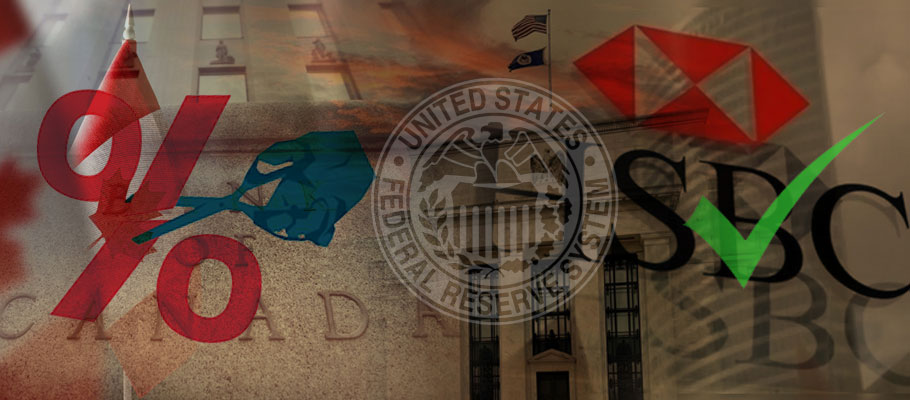
Published: May 29th, 2024
Policymakers at the Bank of Canada (BoC) will skip an expected rate cut next month to avoid diverging from the timeline of the US Federal Reserve, where rate cuts are anticipated later in the Summer.
The prediction comes via a recent analyst note from HSBC’s Forex Strategy Unit. The bank’s analysts say that while many central bankers try to stay in-sync with Fed rate policy, geography and trade deals mean Canada’s central bank is especially linked to its southern neighbor.
‘Caution regarding US Fed timings will likely compel the BoC’s Governing Council to reign in any independent moves,’ HSBC said.
Looking at Canada’s economic situation on its own merits, HSBC says there is a strong case for a June rate cut. The country is experiencing disinflation and overall growth has been tepid so far this year. Productivity gains have also been poor relative to other G10 nations.
This week saw the Loonie dip following a print by Statistics Canada which showed the country's inflation rate in April had dropped 2.6 per cent year-on-year in April. That was down from 2.8 per cent in March and fell below consensus expectations for another 2.8 per cent reading. The StatsCan data also supported a rate cut as the central bank’s guiding measures of core inflation all fell below expectation.
Matt Arseneau, an economist at RBC, told Bloomberg that the inflation figures give the BoC ‘flexibility to inject Canada’s economy with a bit of oxygen.’ Sustaining a tight monetary policy ‘risks limiting economic growth.’
HSBC believes a June rate cut could still happen but worries about divergence from Washington are likely to stay Ottawa’s hand.
The Canadian and American economies are tightly inter-linked through North American trade and investment treaties, meaning any distance between the policy directions of the Federal Reserve and Bank of Canada can have a larger impact on Canadian growth.
In March, One of Canada's largest banks predicted a bout of Canadian Dollar weakness over the next few months as the Ottawa central bankers faced up to the negative impact of restrictive monetary policy.
An analysis by National Bank of Canada (NBC) described recent positive performance by the Loonie as ‘lukewarm’, especially when contrasted with other commodity currencies like the New Zealand and Australian Dollars.
NBC analysts called CAD ‘the weakest amongst the strong’, blaming low performance against other commodity currencies on underwhelming economic figures.
In a note to investors the bank parsed Canadian economic data and noted areas of weakness undermining Q4 GDP growth statistics, among them confirmation that Canadian domestic demand had fallen for the first time in 12 months.
NBC said the tepid fundamentals of the Canada’s economy could be blamed on Bank of Canada (BoC) interest rate policy, which at five per cent was draining vitality and hindering growth.
‘The downside of the BoC’s restrictive monetary policy is easier to see when you look at private domestic demand, which shrank for two consecutive quarters and has now dipped four times in six quarters.’
‘The bank has lost the justification for maintaining such a restrictive monetary approach.’
NBC also described Canada's most recent labor market print as overly optimistic, as the headline 41K expansion seen in February was inflated by public sector job postings. The bank noted that private-sector employment has sat unchanged since June of last year.
According to NBC, all of this indicated that the Bank of Canada would ‘soon’ be compelled to cut interest rates. On a year-to-year comparison, inflation had already fallen back to Ottawa’s 1-3 per cent target range.
In April of 2023, the Loonie received a shot in the arm as oil prices rose by more than 8 per cent in the wake of a surprise production cut pledge by the OPEC+ group.
Markets were blindsided by an announcement from the crude cartel that saw members agree to slash nearly 1.7 million barrels of oil per day from May 2023 through to December. The Saudis agreed to the most extensive cuts, scaling back production by 500,000 barrels per day.
An analysis by Bloomberg said the move would give support to petro-currencies like CAD. While the cuts would tighten crude supply, the world economy would see a fresh inflationary jolt as a side effect.
Central banks were expected to act, meaning more rate increases than markets had priced-in before the OPEC+ bombshell. At the time (early April), USD/CAD was close to dipping below a bullish trend line after reaching some key support levels.
Alongside the Saudis, Russia extended a previously announced cut of 500,000 barrels per day through to year-end. Several other Gulf states also joined the group policy and announced their own cuts.
A production cut of nearly 1.7 million barrels of oil per day was significant, Bloomberg said, and would meet the cartel’s aim of keeping crude prices supported.
The USD/CAD rate was also impacted by improving risk appetite across financial markets. The US Federal Reserve had been signaling that rate increases might be paused, putting the Greenback on the back foot.
The core PCE Price Index, which is the Fed’s benchmark inflation gauge, came in weaker than expected on Friday 31st March. The OPEC+ announcement followed the next day and will likely compel Fed policymakers to re-think rate decisions.
Meanwhile this week could be a busy one for CAD bulls, with Canadian employment reports, private payrolls and ISM services PMI all due before week’s end.
As recently as December 2022, analysts were saying the return of declining crude oil prices would pull the Canadian Dollar down in 2023.
Analysts at Bank of Montreal (BMO) said a (then) recent dip in oil prices looked like a long-term trend, and is contributing to the Loonie’s recent decline. They do say, however, that an oil price recovery is expected next year. That would give CAD some support.